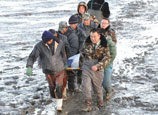
"It's when their basic rights are flouted that they feel angry and may sometimes talk about revenge," said Meng, who was diagnosed with AIDS in 1995.
Who to tell
However a more pertinent issue is the spreading of HIV/AIDS among sexual partners. The latest statistics from the Ministry of Health suggest there were over 490,000 AIDS patients and HIV carriers by the end of October, and that sex had become the predominant means of transmission.
In September, a Web user who claimed to be a 19-year-old student wrote online that his former lover, a pilot at Hainan Airlines, had bragged about having unprotected sex with many people after being diagnosed with HIV/AIDS.
The airline later told media that the pilot identified in the post was HIV positive and had been suspended pending treatment. So far there has been no police involvement, nor is there any evidence to show that the pilot did intentionally spread the disease.
However, it still triggered debates over whether someone with AIDS should inform their sex partners.
Zhang Beichuan, a leading expert on HIV/AIDS intervention, said in most cases people engaging in sex without condoms either don't realize they have AIDS or think they can beat the odds. He added that sometimes, sufferers do intend to harm others or are simply seeking to stop their loved ones from leaving them.
Regulation on HIV/AIDS prevention and treatment states that people infected with HIV are obligated to inform doctors and sexual partners of their condition.
Some provinces such as Yunnan and Gansu have also passed measures to mandate that carriers inform their partners within a month of getting the test results or else the health authorities would. Such policies have been heavily criticized for violating patients' right to privacy.
















 Memorial service held for China's fighter jet production head
Memorial service held for China's fighter jet production head


![]()
